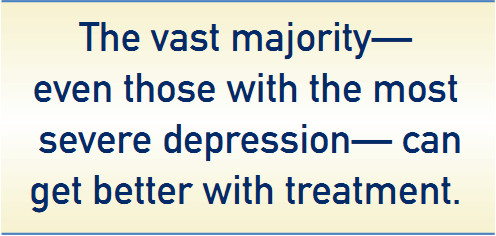
Everyone occasionally feels blue or sad, but these feelings are usually fleeting and pass within a couple of days. When a person has a depressive disorder, it interferes with daily life, normal functioning, and causes distress for both the person with the disorder and those who care about him or her. Depression is a common but serious illness, and most who experience it need treatment to get better.
Many people with a depression never seek treatment. But the vast majority, even those with the most severe depression, can get better with treatment. Intensive research into the illness has resulted in the development of medications, psychotherapies, and other methods to treat people with this disabling disorder.
People with depression do not all experience the same symptoms. The severity, frequency and duration of symptoms will vary depending on the individual and his or her particular illness.
The signs and symptoms of a concussion can be subtle and may not be immediately apparent. Symptoms can last for days, weeks, or even longer.
The most common symptoms after a concussive traumatic brain injury are headache, amnesia, and confusion. The amnesia, which may or may not be preceded by a loss of consciousness, almost always involves the loss of memory of the impact that caused the concussion.
- Sensitivity to light and noise
- Disorders of taste and smell
There is no single known cause of depression. Rather, it likely results from a combination of genetic, biochemical, environmental, and psychological factors. Research clearly indicates that  depressive illnesses are disorders of the brain. Brain-imaging technologies, such as magnetic resonance imaging (MRI), have shown that the brains of people who have depression look different than those of people without depression. The parts of the brain responsible for regulating mood, thinking, sleep, appetite and be-havior appear to function abnormally. In addition, important
depressive illnesses are disorders of the brain. Brain-imaging technologies, such as magnetic resonance imaging (MRI), have shown that the brains of people who have depression look different than those of people without depression. The parts of the brain responsible for regulating mood, thinking, sleep, appetite and be-havior appear to function abnormally. In addition, important
neurotransmitters—chemicals that brain cells use to communicate—appear to be out of balance. But these images do not reveal why the depression has occurred. Some types of depression tend to run in families, suggesting a genetic link. However, depression can occur in people without family histories of depression as well. In addition, trauma, loss of a loved one, a difficult relationship, or any stressful situation may trigger a depressive episode. Subsequent depressive episodes may occur with or without an obvious trigger.
Depression, even the most severe cases, is a highly treatable disorder. As with many illnesses, the earlier that treatment can begin, the more effective it is and the greater the likelihood that recurrence can be prevented.
The first step to getting appropriate treatment is to visit a doctor. Certain medications, and some medical conditions such as viruses or a thyroid disorder, can cause the same symptoms as depression. A doctor can rule out these possibilities by conducting a physical examination, interview and lab tests. If the doctor can eliminate a medical condition as a cause, he or she should conduct a psychological evaluation. Once diagnosed, a person with depression can be treated with a number of methods. The most common treatments are medication and psychotherapy.

If you have depression, you may feel exhausted, helpless and hopeless. It may be extremely difficult to take any action to help yourself. But it is important to realize that these feelings are part of the depression and do not accurately reflect actual circumstances. As you begin to recognize your depression and begin treatment, negative thinking will fade.
The following tips may help you to prevent or minimize your risk of head injury:
- Engage in mild activity or exercise. Go to a movie, a ballgame, or another event or activity that you once enjoyed. Listen to good, upbeat music. Participate in religious, social or other activities.
- Set realistic goals for yourself
- Break up large tasks into small ones. Do what you can as you can.
- Try to spend time with other people and confide in a trusted friend or relative. Try not to isolate yourself, and let others help you.
- Expect your mood to improve gradually, not immediately.
- Postpone important decisions, such as getting married or divorced or changing jobs, until you feel better.
- Remember that positive thinking will replace negative thoughts as your depression responds to treatment.
- If you know someone who is depressed, it affects you, too. The first and most important thing you can do to help a friend or relative show has depression is to help him or her get an appropriate diagnosis and treatment.



